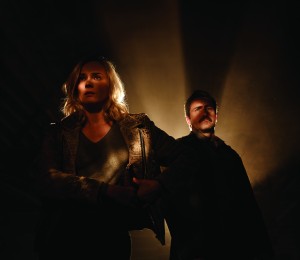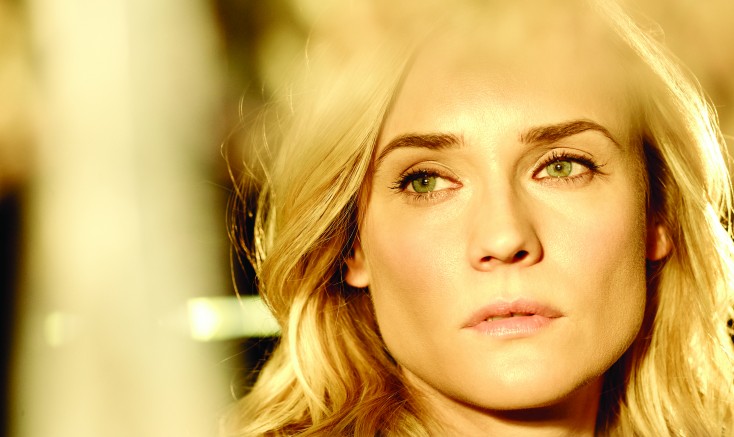
(L-R) Diane Kruger as Sonya Cross, Demian Bichir as Marco Ruiz in THE BRIDGE. ©FX Networks. CR: Kurt Iswarienko/FX
By ANGELA DAWSON
Front Row Features
HOLLYWOOD—As the U.S. grapples with the recent influx of predominantly underage refugees from Central America at the southern border, the FX network’s “The Bridge,” a TV drama about law enforcement officers on both sides of the border dealing with crime, corruption and desperate refugees, is set to launch its second season. The series, which premiered last July, was adapted for American TV from a Danish-Swedish TV series.
German actress Diane Kruger, 37, returns as Sonya Cross, a Texas police detective, who also happens to have Asperger’s syndrome (a high-functioning form of autism). She co-stars with Demian Bichir, who plays a Mexican detective, who (in the first season) worked closely with Sonya on tracking down a serial killer, an investigation that was complicated by drug cartels and corruption.
The 13-episode second season premieres Wednesday, July 9 at 10 p.m. ET/PT.
On a short break from shooting, Kruger, who is reported to be dating former “Dawson’s Creek” star Joshua Jackson, recently spoke by phone about the show, playing someone with autism and pros and cons of starring in a TV series.
Q: Your character, Sonya, is rather unconventional for television, but her condition limits the range of emotions you can play. How do you take an emotionally stoic role and make it personally satisfying as an actor?
Kruger: It’s been a real challenge, not just for me, but I think also for (executive producer) Elwood Reid and the writing team to continue to evolve her character and give her storylines where she can show emotion and nuance. Obviously, people who have Asperger’s have emotions; it is just that they are delayed and come out in the most unexpected moments. In Season Two, we will get to see a lot of Sonya’s personal life and her relationship with Ted Levine’s character ( Lt. Hank Wade) and Demian’s character, obviously, tested. It’s a very dark and quite emotional season, so it’s been very satisfying.
Q: Do you know why they didn’t mention her condition specifically in the first season?
Kruger: That was part of what they learned from the original Scandinavian show. They never mentioned it either, and I think it was a great decision. Just because she has Asperger’s, people don’t go around (announcing it). It was just a way of piquing everyone’s interest and making that assumption and diagnosis themselves.
Q: What’s going on at the U.S.-Mexico border right now has made international headlines with the children arriving daily from Central America. It’s all very new, but has there been any discussion about incorporating what’s happening into the series?
Kruger: There’s definitely been discussion. It’s actually funny you bring that up. Just yesterday, I was talking to Elwood about this. We’re (shooting) episode 11, so I’m not sure that we’re going to be able to incorporate it into this season, but if we should get a third season, I think there is definitely a place for that. It’s just actually amazing that while we’re in production how much happens at those borders. I mean we could probably go on for 10 seasons and have stories to tell of people’s crazy journeys. It’s definitely been discussed.
Q: What personal relationships or cultural dynamics are you most interested in exploring? What are you looking forward to learning more about your character and what do you think is the most intriguing aspect of the show?
Kruger: Sonya is a very complex character to play, so the real challenge is to give a really nuance performance and really pushing myself to make sure that we see a very complete picture of a woman living with Asperger’s. I’m always intrigued. I learn so much from the show about stories that actually happen on the border. A lot of our stories are inspired by real-life events, and as you know it’s a very volatile area. The stories that I read about and learn about are often discussed, not just on set, but when we get pitches for upcoming episodes. It’s been a very satisfying experience working on a show that is politically relevant and quite timely.
Q: What do you think sets your character apart from some of the other roles that you’ve played in the past?
Kruger: Hopefully, every character that I take on as I grow older becomes more interesting, and, as I grow older, I have more to bring to the table, more experiences that I’ve lived myself, so I’m hoping that I can color my characters more and more. Sonya’s certainly been very challenging and continues to be so, and it’s been a very satisfying season so far. I feel like we really get to learn a lot about her.
Q: How did you go about getting the nuances of someone with Asperger’s, because it can be a really challenging role to pull off without going over the top?
Kruger: Yes, that continues to be really daunting for me. The research on it was really intense before we started Season One. I was able to be around someone who has Asperger’s for a long time who is very high functioning. It was very interesting to be able to just observe his limitations. I asked him when he comes to certain limits what goes through his mind, why does he behave certain ways and what is it that makes him uncomfortable. I feel like in Season Two, because I know the character better and I just know so much more and have met so many people who have Asperger’s, I feel like I can make it my own a little bit. I’m really comfortable now to push Sonya because I think she wants to learn to be better socially. The writers have given me the opportunity to branch out and evolve, with Sonya, yet she still has Asperger’s, but she’s trying to be different.
Q: Do you ever come across any moments that make you uncomfortable, but you know that’s what a person would do, like when Sonya had a one-night stand, and it was kind of slam-bam kind of thing?
Kruger: I find myself being very protective of her because I think it’s natural for the directors or even for people who observe a scene while it’s being filmed to want something that is a little safer. For example, we did a scene where somebody dies and it’s a very beautiful, teary-eyed scene. Then, somebody touches my character on the shoulder, and in that moment, Sonya overreacts. So I did the scene and it was quite extreme. My writer, who was on set the day, was like, “Well, maybe we should do one where she’s not so angry,” and I kept saying, “No, no. We have to have it this way.” So I find myself really trying to protect the integrity, even though I know it’s going to make people uncomfortable. We’re just going to have to be okay with that.
Q: How do you think this season will differ in tone from the first?
Kruger: It’s a very different show in many ways. We don’t really have a classic serial-killer storyline. We were following the original Scandinavian show in Season One, and now we’re completely on our own and have our own stories. Elwood Reid is the main voice of the show, and his vision of it this season is darker for sure, but also more complex. There’s not just one storyline per se, so our personal lives get involved in what is happening on the border. There are many different storylines that sort of happen at the same time, and, seemingly, are not connected. The American involvement in the (drug) cartels plays a big part.
Q: How do you balance a busy work schedule and make time for your love life?
Kruger: Like most people, you take the time for the people that are important in your life. That’s not always easy, but I love what I do and feel very lucky that I get to go to work every day. We shoot in Los Angeles, so I get to sleep in my own bed every night, which has been very nice.





